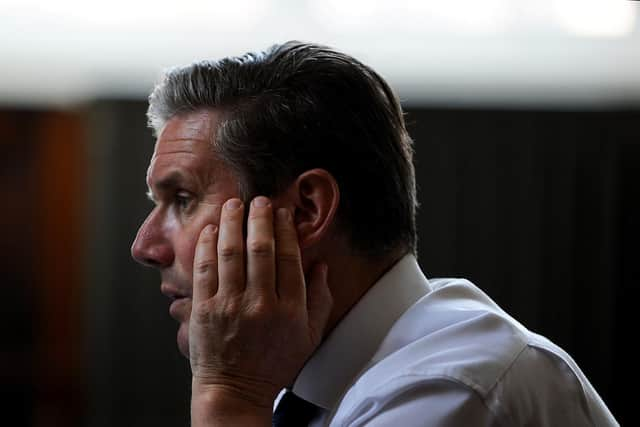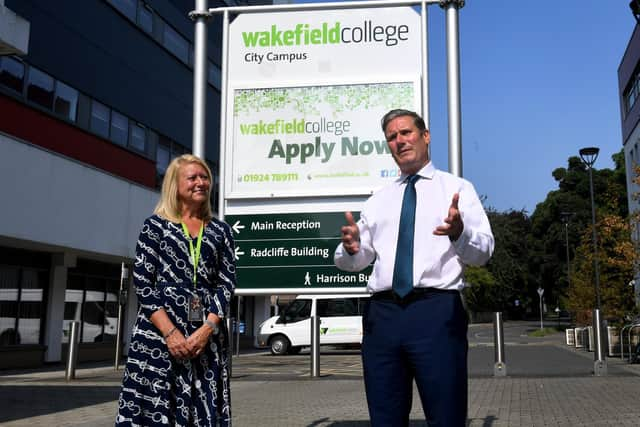Exam results 'fiasco' combined with new recession could paint bleak picture for students in northern areas not yet recovered from previous financial crash
On a visit to Wakefield and Barnsley today, Sir Keir met with teachers and also with local authority leaders in areas of West Yorkshire still under restrictions due to coronavirus spikes.
Sir Keir said teachers told him of “their concerns about the fiasco the government's got itself into in relation to exam results”.
Advertisement
Hide AdAdvertisement
Hide AdSpeaking to The Yorkshire Post he said: “Nobody thought this was going to be easy for obvious reasons, but the issue in relation to exam results has been sitting there for months, and suddenly with 48 hours or less to go, the government changes the policy in a completely chaotic way.”


Ministers today denied that the exam system in England has been thrown into confusion after Education Secretary Gavin Williamson announced late on Tuesday that students will be able to use their results in mock tests to appeal if they are unhappy with the grades they are given.
The move comes in the wake of a dramatic U-turn by the Scottish Government.
Scotland’s Education Secretary, John Swinney, announced on Tuesday that moderated grades would be scrapped following a massive outcry after more than 124,000 results were downgraded.
Advertisement
Hide AdAdvertisement
Hide AdAnd Sir Keir said students in deprived areas of Yorkshire found themselves in an unenviable position after evidence from Scotland showed more deprived areas, which often have lower levels of attainment to begin with, suffered at the hands of the moderation process, but that also mock exam results would not reflect their hard work.


He said: “You're doing a huge disservice to young people because all of the teachers I spoke to said that they would expect all of their young people to do better in the real exam than they did in the mock exam, which is intended to help on interventions etcetera to get you ready for the real thing.”
He added: “We'll have to wait for the results but it's anticipated that up to 40 per cent of young people will have their grades altered, and if it's anything like Scotland, it will be those in deprived areas that are going to have their grades altered, which this risks robbing a generation of their future.
“Young people and their families, and their schools and colleges, work really hard. It is a very significant moment for them, whether they're going on to higher education or whether they're going on for apprentices or work.”
Advertisement
Hide AdAdvertisement
Hide AdBut Mr Williamson said the exams system will deliver “credible, strong results” for the overwhelming majority of young people.
In an interview with the BBC, Mr Williamson said: “The system, for the overwhelming majority of young people, is going to deliver, you know, credible, strong results for every single one of them.
“It’s a robust system, it’s a fair system, it’s making sure that young people get the grades that they’ve worked so hard towards.”
Mr Williamson continued: “What is key is giving young people the opportunity to move on to the next stage of their lives, making sure that they have the opportunity to go on to college, go to university, take an apprenticeship, go into the world of work.”
Advertisement
Hide AdAdvertisement
Hide AdHe added: “We’ve got a system that is, I believe, the fairest that we can do; but let’s not forget that we’ve been in a global pandemic, we’ve been in a situation none of us would have expected to be in.”
The Education Secretary also apologised to children whose learning had been disrupted by the Covid-19 pandemic.
He said: “I apologise to every single child right across the country for the disruption that they’ve had to suffer.”
However even if pupils come out with fair grades tomorrow, the recession which Britain was plunged into today risks their ability to get a good start in their adult life, especially in areas of the North yet to recover from the previous recession which ended in 2009.
Advertisement
Hide AdAdvertisement
Hide AdIt has been warned that thousands of new people might start looking for jobs in coming months as a cohort of students and workers who lost their jobs after furlough come onto the jobs market.
Figures earlier in the week showed that many of the 730,000 people who have been taken off UK payrolls have not yet started hunting for work.
Sir Keir said: “The virus is picking away at structural inequality. It's very much more deprived areas that have been hardest hit on the health problems, and now what we're beginning to see is the hardest hit on the economic front as well.
“I just had a call with the local authorities for Calderdale, Kirklees, and Bradford which are obviously under additional restrictions now, and they very strongly made the point to me that the universal credit claimants have gone up in their areas quite dramatically, sometimes as much as 90 per cent.
Advertisement
Hide AdAdvertisement
Hide Ad“So what you're seeing is the local impact is greater. We have got to get to grips with the structural inequalities that are playing that part here.”
But the Labour leader said the virus’ propensity to hit the worst off hardest was one of the key drivers behind the importance of getting children back to school in September.
Sir Keir has come under pressure from teaching unions to back them over a 200-point checklist of safety demands which they want to see met before schools are reopened, which education select committee chair Robert Halfon MP branded “impossible”.
By distancing himself from the demands Sir Keir risks further alienating the left wing of his party by seeming to side with Boris Johnson on schools reopening, amid rising factional tensions within Labour.
Advertisement
Hide AdAdvertisement
Hide AdBut Sir Keir said: “I have to be absolutely clear on this, we absolutely need those children and young people back in our schools and colleges, there are all sorts of problems that arise when children and young people are out of school and college for a prolonged period.”
He said: “Actually, although a lot is made of the differences, I think that is where the trade unions are, it’s where the Labour Party is, people want our young people back into school.
“A real problem here is the government that hasn't planned this over the last few months, it was obvious from the day that schools and colleges were closed what the problems would be. We haven't had a plan that's really matched the scale of the challenge.”
He added: “Do we want young people back into the schools in September? It’s a very loud yes from me, and I will support the Government on that.”
Advertisement
Hide AdAdvertisement
Hide AdBut he said the test and trace system needed to be “vastly improved” for that to be safe.
And he added he would like to see the same ambition given to the Nightingale Hospitals to set up extra classrooms, for example.
He added: “I don't think anybody's going to fall for the government's approach which is to try and point the finger at other people, but the buck stops I'm afraid with the government and with the Prime Minister as well.”
Regulator Ofqual will be asked to determine how and when valid mock results can be used, with schools being required to submit the evidence to the exam board.
Advertisement
Hide AdAdvertisement
Hide AdStudents will also still be able to sit exams in the autumn if they are unhappy with the grades they secured in mocks, or if they are dissatisfied with results awarded by exam boards on Thursday.
All three grades will hold the same value with universities, colleges and employers, the Department for Education (DfE) said.
Mr Gibb said it was designed as a “safety net” and would not lead to “grade inflation”.
“It is just making sure at the edges that no student is disadvantaged. This is just to give a safety net for any student who might fall through the system,” he told Sky News.
“It will only affect a small group of people. Most young people tomorrow will get the grade that the teacher sent in to the exam board that they thought they would get.”
Comment Guidelines
National World encourages reader discussion on our stories. User feedback, insights and back-and-forth exchanges add a rich layer of context to reporting. Please review our Community Guidelines before commenting.